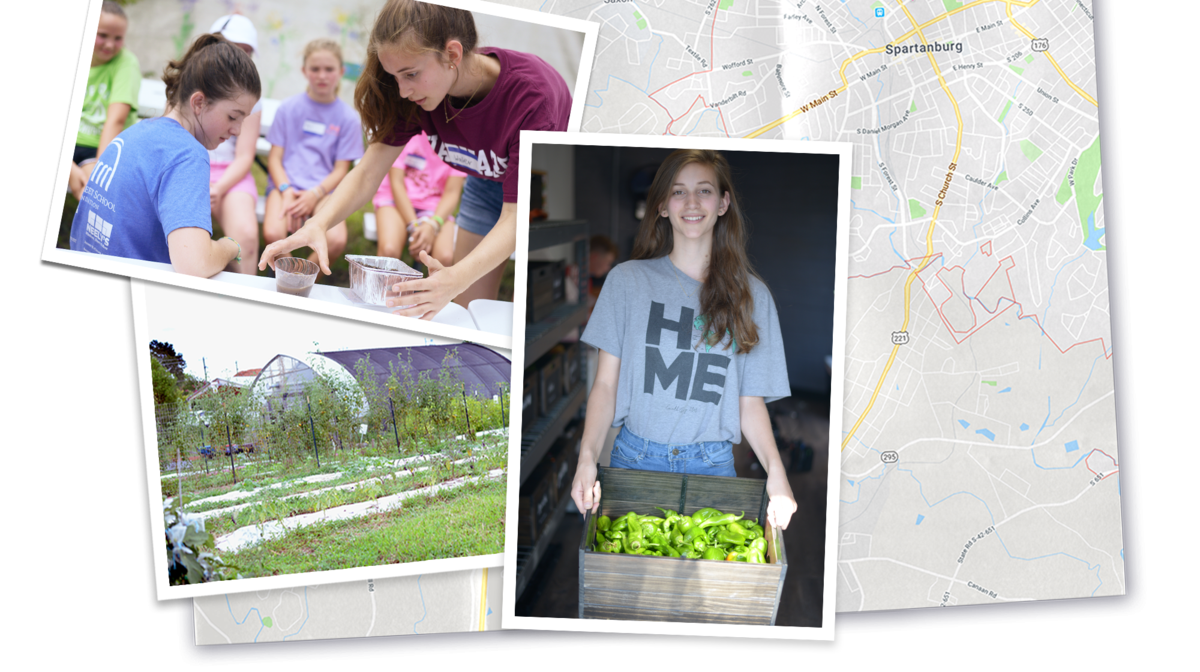
Izzy Goodchild-Michelman, as part of the Harvard’s Service Starts with Summer Program, produced food, assisted children’s education, and wrote grants to support Hub City Urban Farm.
Kai-Jae Wang/Harvard Staff
Growing home
“I knew I wanted to do something impactful, and not just a project that I thought was important, but [one that] would be addressing an issue that was there.”
Izzy Goodchild-Michelman, A.B., ’23, grew up in Spartanburg, S.C., and knows that parts of her home county are food deserts.
She decided she wanted to do something about that — both make healthy and sustainable foods easier to get as well as teach young people about why plant-based nutrition is both better for them and for the environment.
“I knew I wanted to do something impactful, and not just a project that I thought was important, but [one that] would be addressing an issue that was there,” Goodchild-Michelman said about her choice to work with Spartanburg’s Hub City Urban Farm as part of Harvard’s new Service Starts with Summer Program, which encourages incoming first-year students to find ways to lend a hand in their home communities before starting at the College.
The nonprofit farm provides agricultural education and delivers and sells homegrown food to those parts of Spartanburg County where getting to a grocery store can take as long as 90 minutes over multiple bus rides.
Though it spans less than half an acre, the Hub City Urban Farm grew 1,800 pounds of produce last year. All of its organic fruits and vegetables, from tomatillos and okra to melons and pawpaw, are sold from a truck that visits 15 sites each week.
“As kind of an environmental science nerd, seeing the sustainable practices that they put in place, [seeing] how they’ve been able to cultivate in an ecologically friendly way, is supercool,” Goodchild-Michelman said.
Goodchild-Michelman helped out with day-to-day crop maintenance at the farm but spent the bulk of her time writing grants to fund and revamp the farm’s educational Seed to Table curriculum that’s used with elementary and middle school students.
During her time on the farm she practiced and improved these lessons with groups of kids, including a local Girl Scout troop.
In one lesson, each Girl Scout wore a different sticker on her T-shirt that identified her as a part of the ecosystem (for example, as sun, water, rock, lettuce, bird). The girls passed around a ball of orange rope and considered their interconnected roles in the complex web being formed.
Leading the lesson, Goodchild-Michelman instructed the scout playing “water” to let go of her part of the rope. It caused the entire web to lose its shape.
“Everything starts to fall apart in the ecosystem even if just one part disappears,” Goodchild-Michelman said to the group.
Goodchild-Michelman says that the work done on the farm fills a gap in the community. “I love South Carolina, but there are a lot of things we need to work on in our educational system,” she said. “I experienced that to some extent, but I was able to get reinforcement outside of the classroom. Not every kid is that lucky.”
Goodchild-Michelman’s work this summer is helping to change that.
“Seeing the smiles on the girls’ faces — and seeing a couple of them really understanding those scientific and ecological concepts — made me happy.”
This story is part of the To Serve Better series, exploring connections between Harvard and neighborhoods across the United States.





